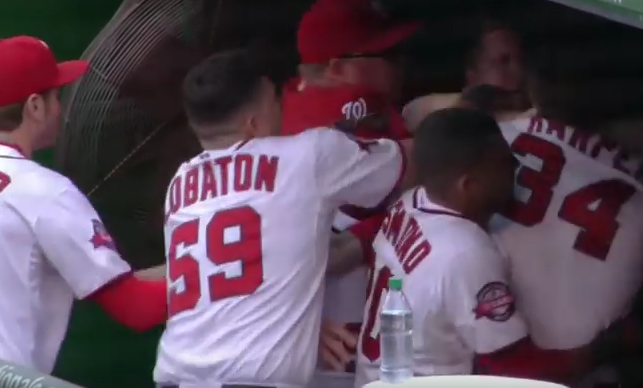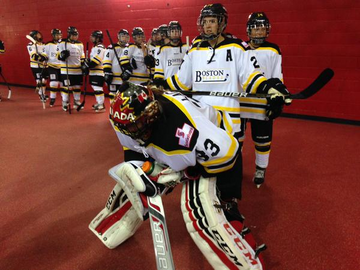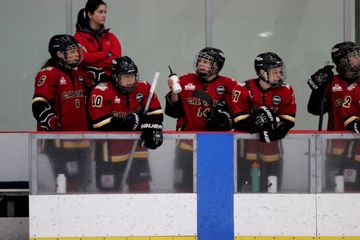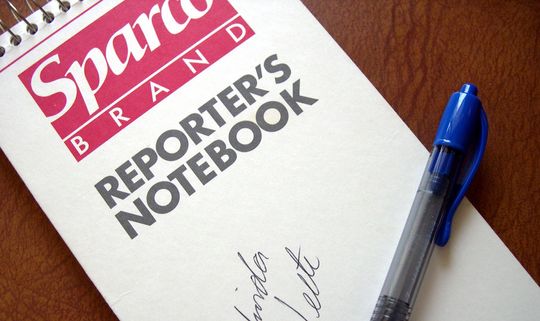Welcome to Victory Press Essays, where we share thoughts and opinions about social issues in sports. Today's essay, by staff writer Angelica Rodriguez, focuses on masculinity and respectability politics in professional sports.
When Washington Nationals reliever Jonathan Papelbon lunged for his teammate Bryce Harper’s throat at the tail end of a heated exchange, baseball fans had a lot to say about it. While plenty of people pointed out the fact that Papelbon could have seriously injured Harper by choking and slamming him into a concrete wall, plenty more were pointing out how somehow, Harper deserved what he got. He’s a brat, they said. He’s mouthy, they said. He’s disrespectful. He needs to learn how to play the game the right way.
I don’t watch baseball, and I definitely don’t know the MLB rulebook, but I can wager a good guess that “be less mouthy” isn’t one of its explicitly written codes.
Whenever something like this comes up -- an altercation between teammates, a controversial (and perhaps out-of-context) quote, an over-the-top celebration, a wayward post on Instagram -- words like “respect” and “integrity” are thrown around in futile attempts to gain control of the situation. Simply put, we aren’t used to seeing such humanity from players who we’ve been led to believe are polite, bland, somewhat antiseptic shells of beings; aka the “right” kind of player. After all, league-approved interviews, video segments, and tweets from team accounts all work to put forth the side of an athlete that best serves the team’s interest: the league’s bottom line.
When people don’t play along with that image -- when they step out of what everyone who came before them has designated as “the line” -- feathers get ruffled. Chests start to puff. And everyone connected to the game, not the least of whom are former athletes from “back in the day,” decides to weigh in.
This happens periodically in hockey, where the good boys are good ol’ boys, if you get my meaning. Hockey takes the word “team” to a whole new level. The nicer, blander and less apt to stray from the script you are, the better off you fare. And the more you speak up or “showboat”, the worse you are for the locker room, or so they say.
When Evander Kane was caught taking photos with stacks of cash on Instagram, he became a “problem child.” He’s trying his luck with the Sabres now, after being essentially run out of Winnipeg on the strength of this label and a couple of run-ins with teammates, including one where Dustin Byfuglien threw Kane’s tracksuit (which violated the team dress code) in the shower. Rumors that Kane did not get along with some of his teammates were brought to light.
When asked about the tracksuit incident, both Byfuglien and Jets captain Andrew Ladd spoke to the unwritten rule of “we deal with our own,” saying that it wasn’t anyone else’s business what went down...even though what went down would amount to bullying and harassment in any other workplace.
Some of the media in Winnipeg said this situation was caused more by Kane’s ego than any other issue, citing his history of “drawing attention to him and away from [his] teammates.” Because of course, above all, Kane has to play “the right way,” and “the right way” involves a shut mouth and no personality, especially on social media.
This trend doesn’t stop at Evander Kane. PK Subban has long been a polarizing figure in the hearts of NHL fans and media alike. He’s booed in many opponents’ arenas simply for stepping onto the ice. You either love his charisma and his intensity, or you think he’s the biggest pain in the ass ever to wear a Habs jersey (which is impressive). Much of this has to do with the idea that he’s talented, and he knows it -- the word “showboat” comes to mind.
Somehow, knowing you’re good at what you do has translated into a lack of respect for the game and the rest of its players, rather than what it is at its core: confidence. Sure, cockiness, maybe borderline arrogance. But a confident player is a good one -- right?
When any Russian player doesn’t seem to want to bog himself down in the stultifying system of North American hockey, he becomes “uncoachable.” (Alex Ovechkin usually tops this list of “coach killers.”) The phrases “selfish,” “enigma,” and “lacks defense” come to mind. Ovechkin, Alex Semin, Alexander Radulov, and more recently, Mikhail Grigorenko -- so many of these European players have question marks and asterisks attached to their scouting reports, and they all have to do with “attitude.”
When Josh Ho-Sang recently arrived late to Islanders training camp, he was promptly sent home, and Garth Snow, the man who drafted him because “they hated me too,” was suddenly talking about the need for his prospect to “grow up.” Matt Barnaby, he of the multiple run-ins with police (including a domestic violence charge and a DWI while attempting to operate a car with only three wheels), posted tweets calling into question Ho-Sang’s “heartalidge,” which I can only assume is a piss-poor attempt at a pun for “character.”
“Character” is apparently how you play the game the right way. Except you don’t quite find any stats on a scoresheet that quantify “character.”
There are certainly goals, assists, total points, power play stats, and plus-minus, and if you really want to get fancy, there's Corsi, Fenwick, zone start percentage...you get the idea. All of the players mentioned are more than capable of contributing to those categories, thus helping their teams win games and even championships -- but are somehow “not playing the game right.”
Was there a section in the NHL rulebook that I missed? Is there a setting on the player charts I’ve got turned off? Or is this idea of “playing the game right” simply a big, fat subjective lie to get younger, unorthodox players in line as early as possible?
It starts with the fact that the people deciding the “right” way to play are members of the old guard -- former players who now take on the roles of coaches, general managers, and members of the media. Barnaby, Jeremy Roenick, Darren Pang, Mike Milbury, and Don Cherry are some names that immediately come to mind when it comes to the media -- the ones who are conveying these messages to the public.
Media are the gatekeepers to information, which means that we can shape certain messages and perspectives. As part of the “old school” of professional men’s hockey, Milbury, Cherry, and others have been vocal about the game remaining old-school, with all that that implies. Anyone who doesn’t keep their head down and mouth shut earns the “immature” treatment. These men fail to account for the shifts in our larger culture that affect the smaller subsets, such as sport.
Professional sports, much like any other form of entertainment, reflect society in a concentrated form. As society changes, so do the people within it; and those people participate in a number of activities, like sports. Therefore, social changes begin to manifest themselves within the context of the sport. Unfortunately, many of the already-present social mores and roles ingrained in our culture are similarly manifested, so it becomes a duel of old vs. new, patriarchal vs. progressive.
When new ideas crop up about what it means to “be a man,” there’s always pushback from those who stand to lose power. This seems to be even more prevalent within professional sports, which are often hyper-masculine in nature. Within sports, the process to gain access to the inner sanctum usually involves some level of bowing to those who came before you -- even if those who came before you have no respect for the work that you’ve already put in to get there.
It also involves conformity to the “old way” of doing things, even as technology and social attitudes prove to have evolved. We’ve seen it with the tremendous pushback against advanced statistics, a battle between numbers and “intangibles” that has some playing the old “you’ve never played the game, so shut up” card. We also see it when it comes to changing opinions around the importance of physical and mental health, as well as celebrating individual spirit among members of a team.
Hockey has romanticized the image of the noble warrior who plays through a broken leg, puts himself last in every sentence (or deletes himself entirely), and is perpetually and only humble and grateful for the opportunity to do what he did as a child, for a living. Those who had to scrap for everything -- the Cherries, the Milburies, the Barnabies -- are the defenders of this unrealistic icon. They did it, so everyone else has to do it too. Anyone who protests or tries to move forward from this antiquated image is labeled as “soft” or “selfish.”
This is why those among the most naturally talented on the ice -- Subban, Ovechkin -- are the most criticized. They don’t exude humility all the time. They truly look as though they are having the time of their lives on the ice. Somehow, this means they don’t “respect the game.” They also know their worth as players. Somehow, this means they put themselves ahead of the team.
Note that this isn’t always the case: Sidney Crosby, one of the generational talents of this century and a long-time media favorite, isn’t nearly as criticized. Then again, barring injuries, he is the very image of the “noble warrior” mentioned above -- he's selfless, he plays defense, and he rarely says anything out of line to the press.
There’s also a disturbing racial and cultural element at play. As of the 2013-14 season, according to Sabres blogger Alexander Bauer, the NHL was anywhere from 93 to 95 percent white. QuantHockey.com puts the percentage of Canadian players at around 50 percent as of this season, with American players at nearly 25 percent, making the majority of players -- 75 percent -- North American.
In case you didn’t notice earlier, Ho-Sang isn’t white. Neither are Kane or Subban. Nail Yakupov, slammed as a “showboat” for an exuberant goal celebration two seasons ago, is an ethnic Tatar from Russia. Most other Russians don’t get the benefit of the doubt that their Canadian compatriots do. Just ask veteran Hockey Night in Canada co-host (and noted xenophobe) Don Cherry, who constantly makes comparisons to “good old Canadian boys” and takes every opportunity to mangle the pronunciation of any name that is remotely European-sounding.
Darren Pang even had a cringe-worthy Freudian slip a few seasons back when comparing Subban and Alex Pietrangelo of the St. Louis Blues, saying Pietrangelo, among others things, plays the game “the white way” instead of the “right” way. He immediately corrected himself, of course, but as Rachel Decoste wrote for the Huffington Post, things like that can’t simply be taken back when spoken in the context of comparing two athletes of different races within the same sport.
We notice. We wonder. We draw those lines. And those lines end up skewing more toward supporting Whiteness and North American standards when it comes to "character" and "integrity," which is a problem when applying it to players who are not white or North American.
It also speaks volumes when players are discussed more in the context of “respecting the game” from a superficial standpoint, such as hotdogging and showboating, when there are plenty of athletes who have disrespected not only the game, but the lives and bodies of other people, actions that get swept under the rug on a regular basis -- and yes, I'm talking about the athletes who have been arrested or investigated for domestic violence, assault and battery, sexual assault, and rape. These charges are dismissed as simple “distractions” from the real matter, rather than dealt with in an honest and thorough fashion. Does integrity only matter to those in charge when it’s not attached to a woman’s well-being?
When Jonathan Papelbon chokes Bryce Harper and people defend him, it stems from a blend of toxic masculinity and a desire to cling to the past way of doing things. When people slam players like PK Subban and Evander Kane for making themselves “bigger” than the game, you can add racism into the mix. Either way, it’s a long road to get away from the subjective mess that is “respectability” in sports, and it starts with realizing where it comes from. Once we do this, and call it what it is, perhaps we’ll start seeing real, substantial changes in the fabric of the sport.
Photo credit: YouTube/MLB
Editor's note, 10/21/15: The essay was updated to include pertinent statistics regarding the NHL's racial and nationality breakdowns.







